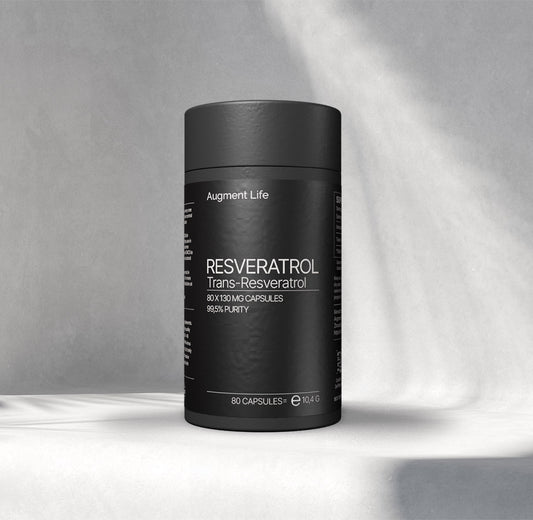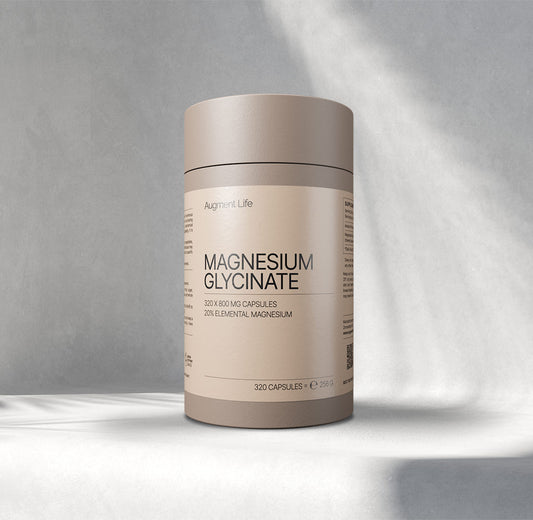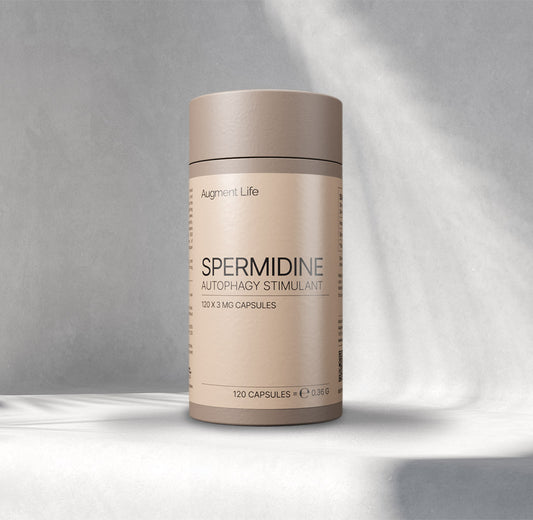Are you a longevity enthusiast who would like to know more about the intricate pathways that happen in our cells? Are the words "mitochondrial theory of aging" and "oxidative stress" familiar to you? Great!
Keep reading and find out what are the AMPK and mTOR pathways, and what is their connection to longevity. Finally, find out which supplements affect longevity pathways.
Mitochondrial theory of aging
You have for sure heard the saying "died of old age", which, to be honest, usually sounds better than suffering from a long disease or a horrible accident. However, what does "dying from old age" even mean? Is it dying from an age-related disease or from the consequences of living?
What the phrase actually stands for is the accumulation of age-related processes in our bodies, and their breakdown when they can't function the same anymore. It seems that with time, our ability to fight off infections, divide our cells, and stop our DNA from mutating and causing problems doesn't work as it once used to. And that happens more and more every day as we age.
There are a lot of moving parts in one living cell that have to coordinate and function properly, let alone in the whole organism. However, the powerhouses of our cells, mitochondria, play a major role in aging.
They are the sites of energy production, at least the major part. The energy molecule they produce is called adenosine triphosphate or ATP for short. They are also sites where most of the oxidative stress in the cell comes from. While oxidative stress and reactive oxygen species (ROS) are important for regulating some other processes, the can be very damaging in higher amounts (1).
How long do mitochondria live in humans?
The lifespan of mitochondria, or better said one mitochondrion, can be anywhere from a couple of days to couple of months. Our body determines how long they will live depending on the type of cell, tissue, or organ. That doesn't mean mitochondria can't divide or that we will lose them all. Mitochondrial biogenesis, or the process of the creation of new mitochondria, constantly happens in our cells.
However, as we age, we can generate less and less of these freshly made mitochondria. The body also can't repair or remove damaged mitochondria by mitophagy as fast anymore. Step by step, their numbers decrease, and so do their important functions.
Here is a comparative example:
- Young, Healthy Individual: In a 25-year-old, mitophagy might clear damaged mitochondria in a few hours to a couple of days, maintaining high cellular efficiency and metabolic health.
- Older Individual: In a 70-year-old, the same process might take significantly longer, potentially several days to weeks, leading to a buildup of damaged mitochondria and reduced cellular function.
Mitophagy is part of the general process of autophagy, where cells remove and reuse old and destroyed parts of the cell. This process can be increased by fasting, and you can read more about this here:

Mitochondrial decline - symptoms
Some symptoms of mitochondrial decline (or having problems in mitochondrial function) in children and adults can be:
- impaired vision,
- hearing loss,
- stunted growth,
- abnormal heartbeat,
- neurological disorders,
- muscular disorders,
- diabetes.
What are molecular pathways?
Living cells perform a whole list of functions at the same time to make sure they can grow, have enough energy, and keep off infections and mutations. Pathways are names for a certain group of biochemical reactions in a cell that result in one or more functions. These pathways can often be triggered by a sudden increase of concentrations of one molecule, for example glucose, or by extracellular signaling.
One example of a pathway would be the release of insulin from pancreatic beta cells. Once we eat our food is slowly broken down to the sugar glucose, which starts circulating in the blood. Pancreatic beta cells can sense this increase in glucose concentration, and will release insulin as a signal to other cells to take the glucose in.
Naturally, the pathway itself happens through a myriad of singular reactions. More often than not, different pathways intersect or have the same triggering reactions. Sometimes, these reactions end up as the same result in the end.
What is the AMPK pathway?
The AMPK pathway stands for "AMP-activated protein kinase" pathway. Remember the energy molecule ATP? AMP is similar to it, but it's a adenosine monophosphate instead of the triphosphate. AMP activates a specific protein, called protein kinase. This activation happens when the cell is running low on energy, meaning it has more AMP than ATP, which triggers the reaction.
The AMP-activated protein kinase will then activate a whole bunch of functions to make sure the cell starts producing more energy right away. It will also stop energy-consuming reactions from happening.
AMPK pathway for longevity
The AMPK pathway is an interesting target for longevity because it represents a connection between energy production in the cells, and all the functions which depend on that energy. By activating the AMPK pathway, you can increase energy levels and regulate:
- metabolic processes,
- cellular homeostasis,
- stress resistance,
- cell survival and growth,
- cell death,
- autophagy,
Many recent scientific studies discovered that an increase in the AMPK pathway prolongs the lifespan of fruit flies (2). This pathway also decreased oxidative stress in rats, mice, and worms (3, 4, 5).

What is the mTOR pathway?
Another functional pathway of great interest for longevity is the mTOR pathway. The name stands for the protein kinase which is the "mechanistic target of rapamycin", because it was discovered as the target of the drug rapamycin in mammalians.
This pathway is another group of complex functions, which are mostly involved in controlling cellular division and cell death. The mTOR pathway controls:
- cell division and growth,
- cell survival,
- metabolism,
- autophagy,
- immune responses.
This pathway is usually affected in a lot of diseases, like arthritis, diabetes, cancer and neurological diseases.
mTOR pathway for longevity
As a central point of many decisions that a cell has to make, the mTOR pathway is a popular target for longevity. However, unlike the AMPK pathway, the mTOR pathway needs to be inhibited to prolong lifespan. Once mTOR is inhibited, the cell division continues, and cell death and protein degradation slow down. However, the exact mechanism of how this happens is not completely clear yet.
Scientific studies have proven that when rapamycin inhibits mTOR, that action prolongs the longevity of yeast cells, worms, fruit flies, and mice (6). A lot of the knowledge on mTOR came from studies that investigated cancer, so a lot of the research on its role in longevity is missing.
Longevity supplements
The AMPK pathway has known activating molecules, and some of them are famous dietary supplements. These are metformin, berberine, and resveratrol, and they are currently being tested for longevity effects in human clinical trials. Interestingly, caloric restriction (and fasting) and regular exercise are also known activators of the AMPK pathway (7).
Caloric restriction and regular exercise also inhibit the mTOR pathway, which prolongs longevity. Rapamycin, of course, is another inhibitor of the mTOR pathway, and a known lifespan prolongation substance.
Another supplement that is a potent activator of the AMPK pathway, and an inhibitor of the mTOR pathway, is berberine. This is a special antioxidant isolated from the berberine plant, that's a popular dietary supplement for weight loss, cardiovascular issues, and the polycystic ovarian syndrome. Research on animal and cell models also shows it could be beneficial in prolonging our life span as well (8).
But, many of these molecules have a status of drugs (like metformin for diabetes), and the proper research for longevity supplementation in human clinical trials is still missing.
Literature sources:
- Hwang AB, Jeong DE, Lee SJ. Mitochondria and organismal longevity. Curr Genomics. 2012 Nov;13(7):519-32. doi: 10.2174/138920212803251427.
- Ulgherait M, Rana A, Rera M, Graniel J, Walker DW. AMPK modulates tissue and organismal aging in a non-cell-autonomous manner. Cell Rep. 2014 Sep 25;8(6):1767-1780. doi: 10.1016/j.celrep.2014.08.006.
- Ning YC, Cai GY, Zhuo L, Gao JJ, Dong D, Cui S, Feng Z, Shi SZ, Bai XY, Sun XF, Chen XM. Short-term calorie restriction protects against renal senescence of aged rats by increasing autophagic activity and reducing oxidative damage. Mech Ageing Dev. 2013 Nov-Dec;134(11-12):570-9. doi: 10.1016/j.mad.2013.11.006.
- Greer EL, Dowlatshahi D, Banko MR, Villen J, Hoang K, Blanchard D, Gygi SP, Brunet A. An AMPK-FOXO pathway mediates longevity induced by a novel method of dietary restriction in C. elegans. Curr Biol. 2007 Oct 9;17(19):1646-56. doi: 10.1016/j.cub.2007.08.047.
- Senesi P, Montesano A, Luzi L, Codella R, Benedini S, Terruzzi I. Metformin Treatment Prevents Sedentariness Related Damages in Mice. J Diabetes Res. 2016;2016:8274689. doi: 10.1155/2016/8274689.
- Papadopoli D, Boulay K, Kazak L, Pollak M, Mallette FA, Topisirovic I, Hulea L. mTOR as a central regulator of lifespan and aging. F1000Res. 2019 Jul 2;8:F1000 Faculty Rev-998. doi: 10.12688/f1000research.17196.1.
- Stancu AL. AMPK activation can delay aging. Discoveries (Craiova). 2015 Dec 31;3(4):e53. doi: 10.15190/d.2015.45.
- Neag MA, Mocan A, Echeverría J, Pop RM, Bocsan CI, Crişan G, Buzoianu AD. Berberine: Botanical Occurrence, Traditional Uses, Extraction Methods, and Relevance in Cardiovascular, Metabolic, Hepatic, and Renal Disorders. Front Pharmacol. 2018 Aug 21;9:557. doi: 10.3389/fphar.2018.00557.












1 comment
Buenos días, quiero empezar a suplementarme y no sé por donde empezar. Me podéis ayudar? Gracias